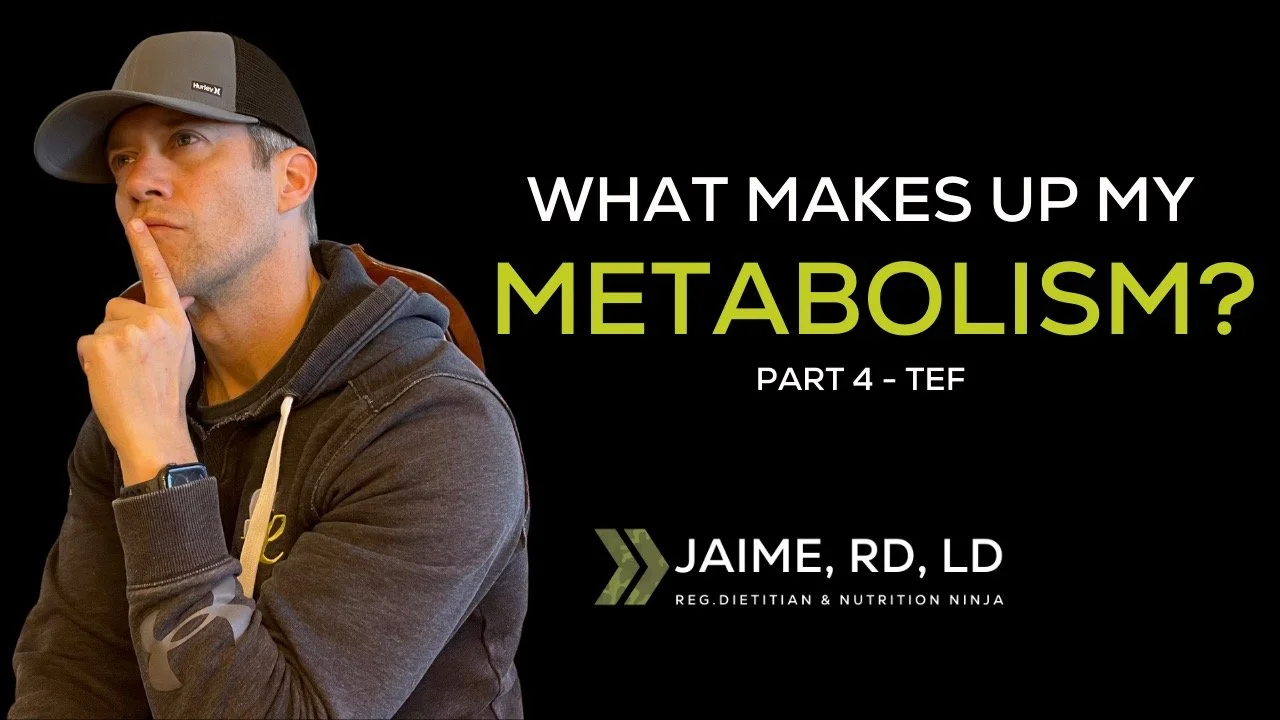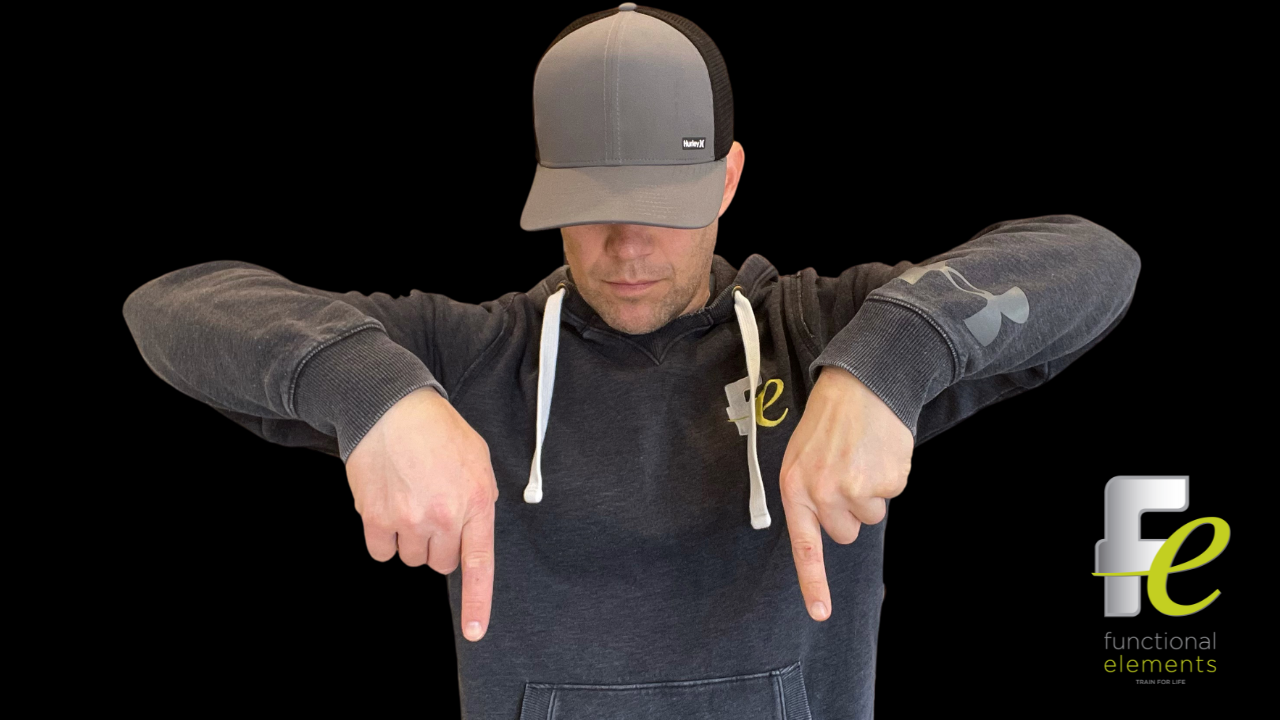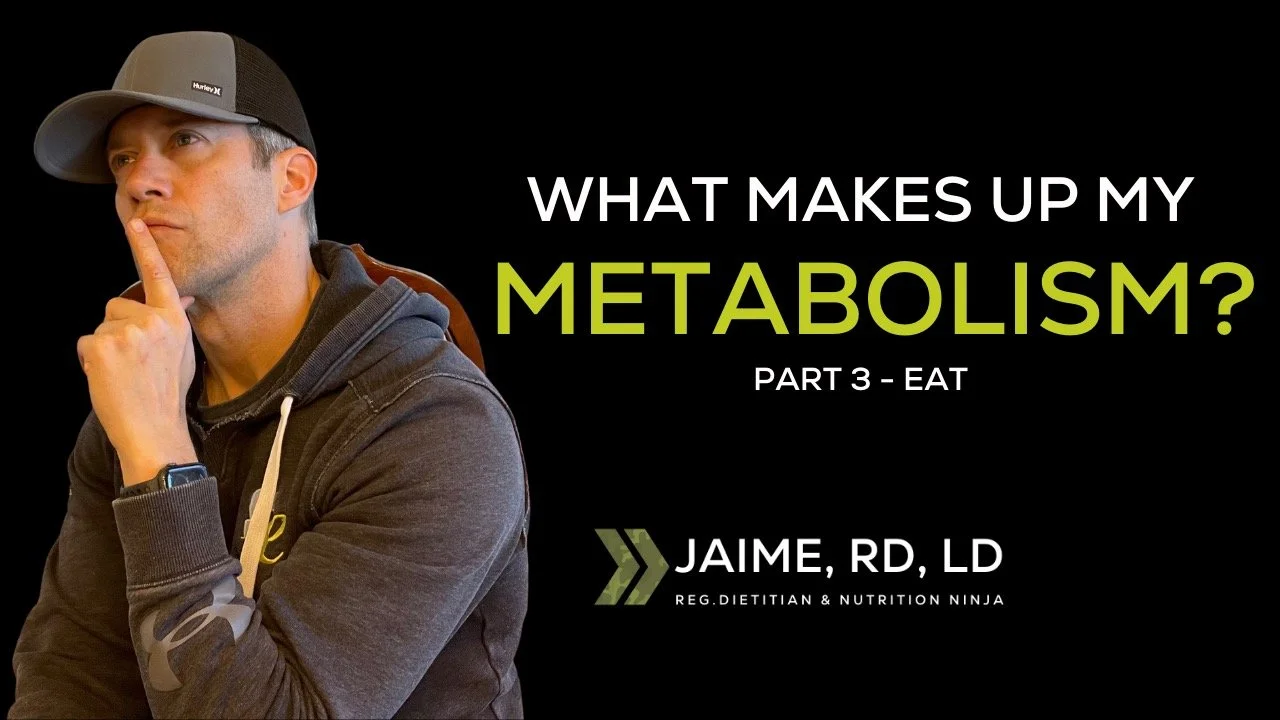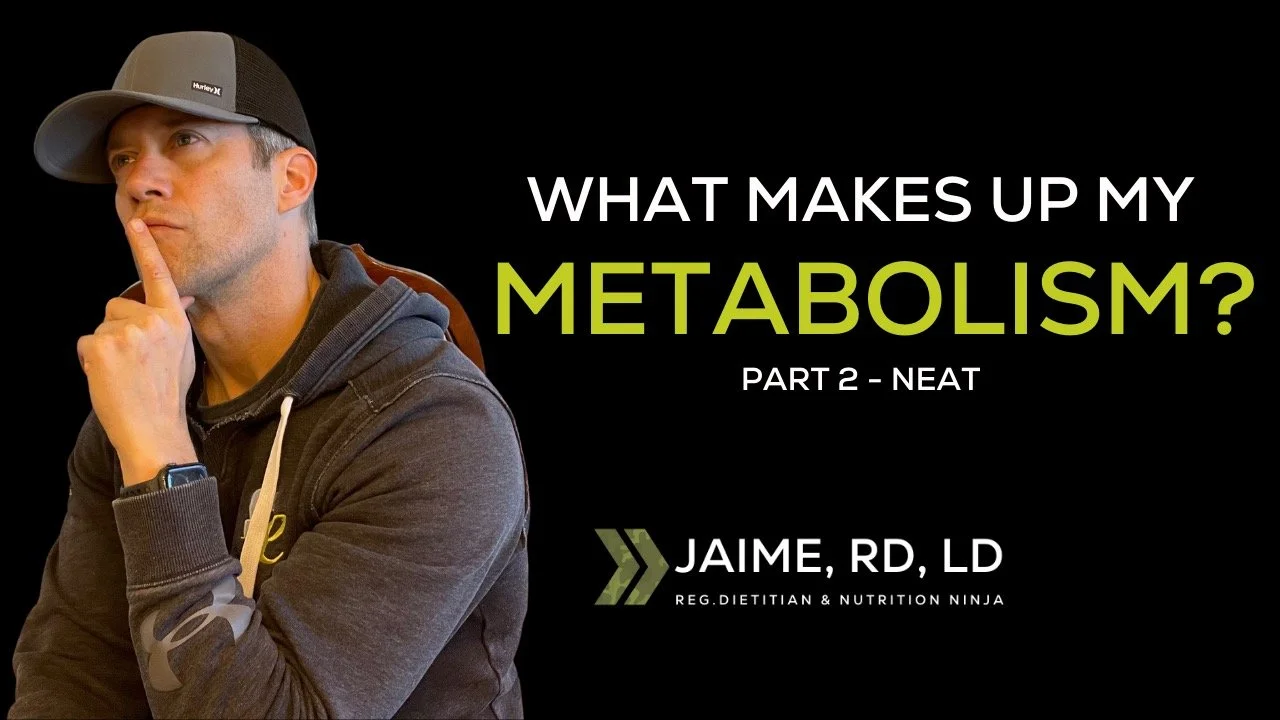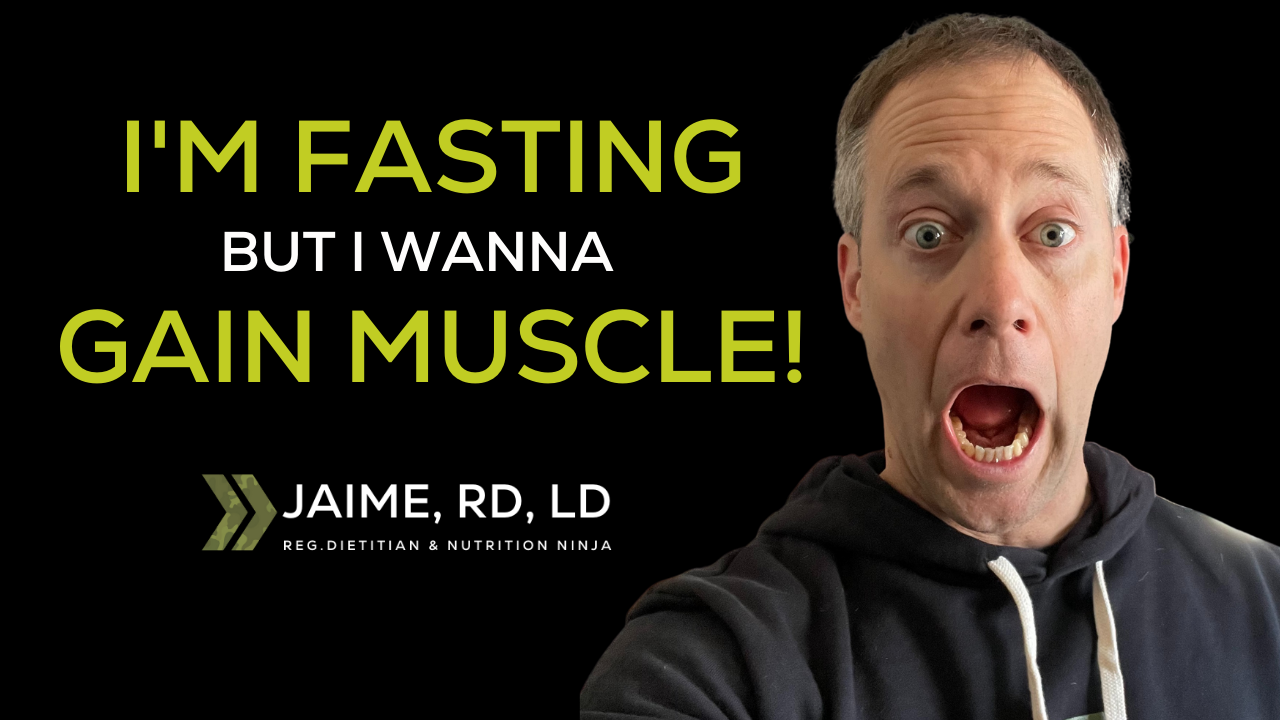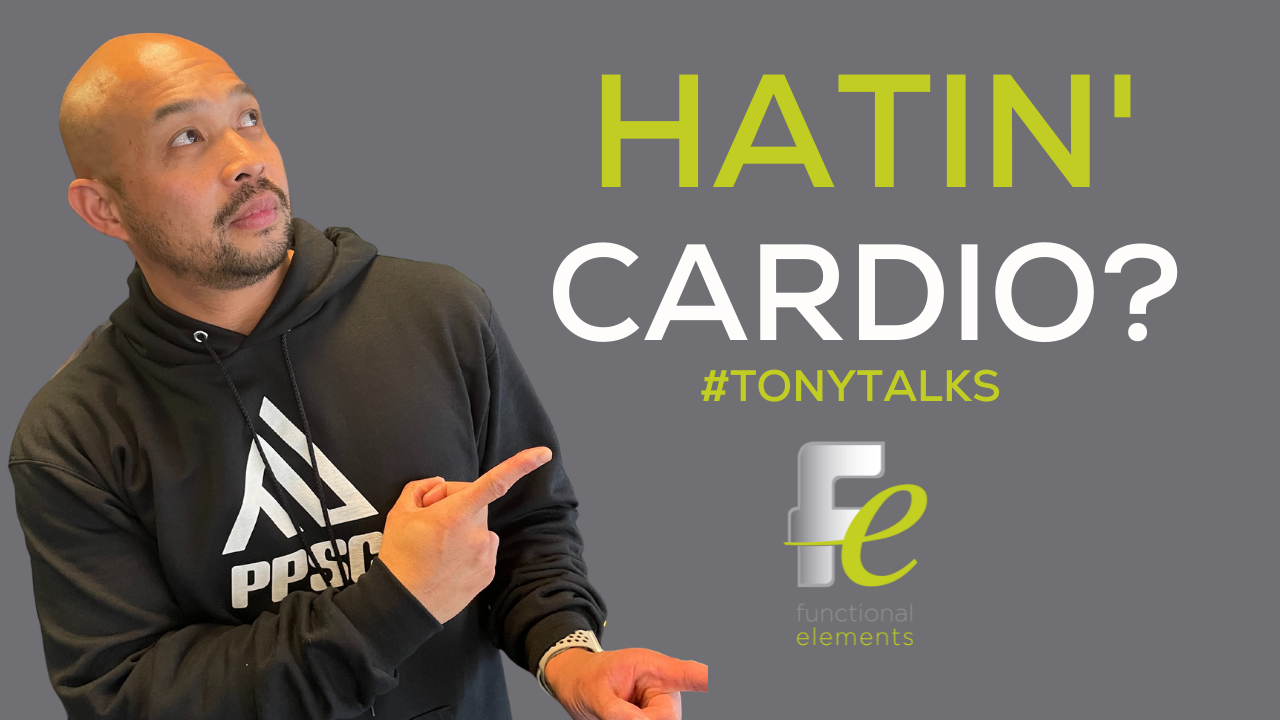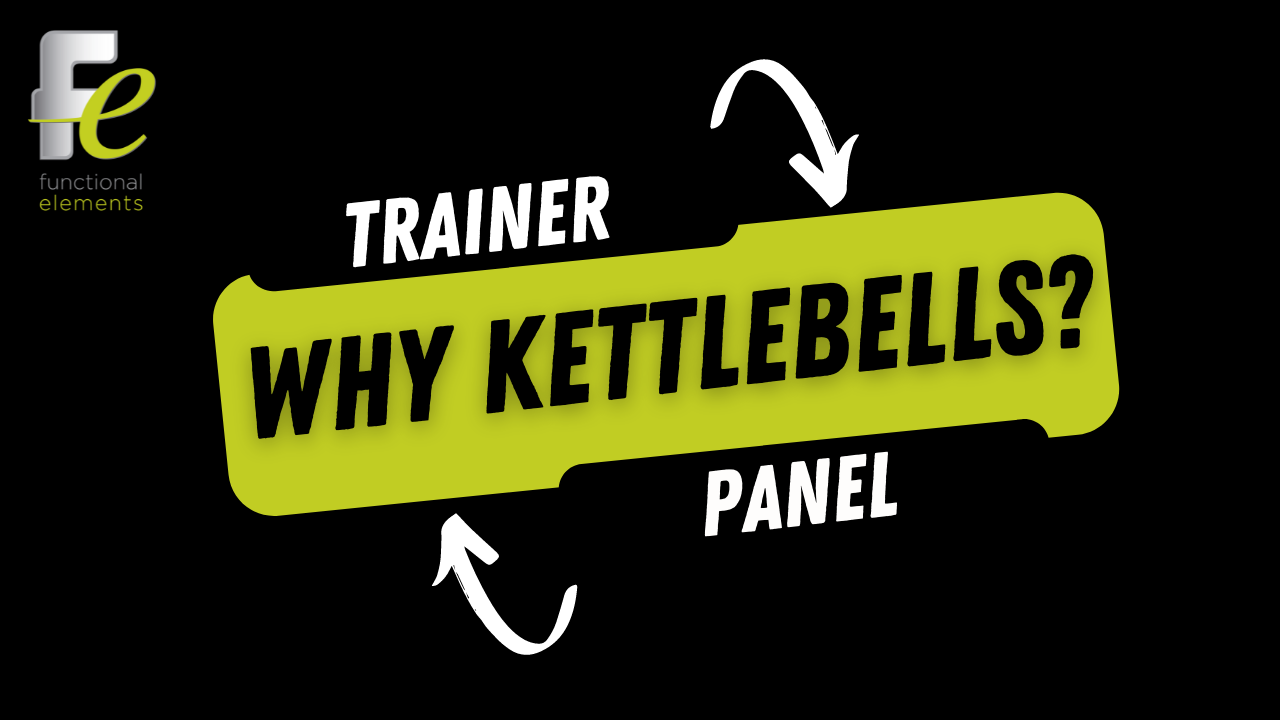What Makes Up My Metabolism? Part 4
METABOLISM - we always hear about it, but what goes into us actually needing all those calories on a daily basis? In part 4 of 5 of his series, #JaimeRDLD covers the component referred to as TEF.
METABOLISM - we always hear about it, but what goes into us actually needing all those calories on a daily basis?
What factors are in our control, and which aren't, when it comes to changing our metabolism?
In this episode (the fourth of five in this short series), #JaimeRDLD covers an additional component - TEF.
#JaimeRDLD #Dietitian
(Run time: 2:21)
Learn more about Jaime's FAB 14 Nutrition Re-boot: https://www.fab14nutrition.com/fab14
Learn more about Functional Elements:
https://www.functionalelements.net
Can I Lose 1 LB of Fat in One Day?
Is it realistic to expect 1 lb of fat loss per day? A commercial that I hear over and over again seemingly every day tells me it is, with the use of their product of course …
Is it realistic to expect 1 lb of fat loss per day?
A commercial that I hear over and over again seemingly every day tells me it is, with the use of their product of course.
In this episode of #AskJaime, I dive in.
Spend just 3 mins with me and find out what I think.
#JaimeRD #Dietitian
(Run time: 2:59)
Learn more about Jaime's FAB 14 Nutrition Re-boot: https://www.fab14nutrition.com/fab14
Learn more about Functional Elements:
https://www.functionalelements.net
Process Over Goal, Here’s Why
We often focus on the goal.
But what’s really important is how we get there.
Because when we do, we want to stay.
I was just on the phone with a potential new client. Let’s call her Mary.
Mary’s goal?
To lose roughly 100-125 lbs.
She seems determined. And I am very much stoked for her and want to do everything I can to help her achieve.
But it made me think about so many of our new nutrition or fitness clients I’ve had initial talks with in the past. Clients who had achieved goals but then quickly regressed, prior to coming to us at Functional Elements.
What I want Mary to be mindful of right out of the gates is that the goal is important, yes, but the true achievement will be maintaining that goal long term after she has reached it.
And that puts the emphasis on the path or process, more so than even the goal.
By human nature, we usually want the quickest path.
The trouble with the quickest path is that it is typically the most extreme. Sure, it may work initially, but extreme very often translates into unsustainable.
Which is why regression often follows success. Standards are set that we can’t maintain.
A path to a training or nutrition goal should be simple. Something that you won’t be fighting every day.
It should be sustainable … something that can easily be adapted long term.
And it should be rooted in good strategy, but flexible enough to evolve along the way based on how your body is responding physically and mentally.
Mary, I love your goal and we’re gonna do this!
But the way we truly win is through process. Trust in it and commit to it consistently. We’ll get there, trust me, and when we do - you’ll be built to stay there!
Remember -
EAT WITH A PURPOSE - AND GIVE YOUR BODY WHAT IT NEEDS, WHEN IT NEEDS IT!
Jaime Rothermich, RD, CSSD, LD, PPSC, CSCS
Functional Elements Training & Nutrition
TRAIN FOR LIFE
What Makes Up My Metabolism? Part 3
METABOLISM - we always hear about it, but what goes into us actually needing all those calories on a daily basis? In part 3 of 5 of his series, #JaimeRDLD covers the component referred to as EAT.
METABOLISM - we always hear about it, but what goes into us actually needing all those calories on a daily basis?
What factors are in our control, and which aren't, when it comes to changing our metabolism?
In this episode (the third of five in this short series), #JaimeRDLD covers an additional component - EAT.
#JaimeRDLD #Dietitian
(Run time: 2:18)
Learn more about Jaime's FAB 14 Nutrition Re-boot: https://www.fab14nutrition.com/fab14
Learn more about Functional Elements:
https://www.functionalelements.net
Is Salmon Jerky Good For Me?
Who knew salmon could be made into jerky?
But is it something I would eat regularly?
In the video find out why I like it and how I use it.
Who knew salmon could be made into jerky?
But is it something I would eat regularly?
In the video find out why I like it and how I use it.
What Makes Up My Metabolism? Part 2
METABOLISM - we always hear about it, but what goes into us actually needing all those calories on a daily basis? In part 2 of 5 of his series, #JaimeRDLD covers the component referred to as NEAT.
METABOLISM - we always hear about it, but what goes into us actually needing all those calories on a daily basis?
What factors are in our control, and which aren't, when it comes to changing our metabolism?
In this episode (the second of five in this short series), #JaimeRDLD covers an additional component - NEAT.
#JaimeRDLD #Dietitian (Run time: 2:42)
Learn more about Jaime's FAB 14 Nutrition Re-boot: https://www.fab14nutrition.com/fab14
Learn more about Functional Elements:
https://www.functionalelements.net
What Makes Up My Metabolism? Part 1
METABOLISM - we always hear about it, but what goes into us actually needing all those calories on a daily basis? In this episode (part 1 of a 5-part series), #JaimeRDLD covers the biggest component of our metabolism.
METABOLISM - we always hear about it, but what goes into us actually needing all those calories on a daily basis?
What factors are in our control, and which aren't, when it comes to changing our metabolism?
In this episode (the first of five in this short series), #JaimeRDLD covers the largest component of our metabolism.
#JaimeRDLD #Dietitian
(Run time: 4:01)
Learn more about Jaime's FAB 14 Nutrition Re-boot: https://www.fab14nutrition.com/fab14
Learn more about Functional Elements:
https://www.functionalelements.net
Do I Need More Protein As I Age?
PROTEIN - it's something I talk about with clients daily. Very important.
But as we age, do we actually need more of it?
PROTEIN - it's something I talk about with clients daily. Very important.
But as we age, do we actually need more of it?
In this episode I'll give you my thoughts.
#JaimeRDLD #Dietitian
(Run time: 2:54)
Learn more about Jaime's FAB 14 Nutrition Re-boot: https://www.fab14nutrition.com/fab14
Learn more about Functional Elements:
https://www.functionalelements.net
Can I Gain Muscle While Fasting?
If I am on a regiment of fasting/TRE, am i still able to grow muscle? Or are these two things mutually exclusive? In this episode I explore a few factors that will help answer this question.
If I am on a regiment of fasting/TRE, am i still able to grow muscle?
Or are these two things mutually exclusive?
In this episode I explore a few factors that will help answer this question.
(TRE = time restricted eating)
#JaimeRDLD #Dietitian
(Run time: 3:13)
Learn more about Jaime's FAB 14 Nutrition Re-boot:
https://www.fab14nutrition.com/fab14
Erythritol … Good or Bad?
When I see ‘sweeteners’ as an ingredient, typically I’ll shy away.
But what about erythritol? Should it be lumped in with others in the ‘sweetener’ category?
Typically we view sweeteners and sugar substitutes as bad, right?
And in some cases, that may indeed be justified.
But what about erythritol?
I came across it the other day in a beverage I found at the store.
No calories. No sugar. But there was erythritol.
Was it enough to sway me?
In this video, I cover what I feel is the good and bad of erythritol.
Redefining Cardio
Cardio can be very boring. Maybe that’s why so many of us hate to do it. Sure, we may activate our heart … but what about our brain?
Maybe it’s time to redefine your cardio …
“Cardio.”
I’ve been training clients for many years. Not many have liked that word.
Why? Simple. Cardio is usually hard and BORING.
Boring because cardio is often equated with monotonous running or machines like ellipticals, treadmills, bikes, etc.
Sure, we may be activating our heart, but our brain? Not so much.
Hence, boredom.
I’m not against traditional cardio at all. It can be very effective.
I’m simply saying there are alternatives that are just as, or more, effective.
And these alternatives can help to engage the brain and keep boredom to a minimum.
But we have to think outside the box a bit. This ain’t your daddy’s cardio!
Think about this … a circuit that includes 30 seconds of med ball slams … then 30 seconds of battle ropes … followed by a sled push. Rest for 30 seconds, then do it again.
Think that won’t get your heart going just as much as a run? Think again.
Or, think kettlebells. There are endless complexes and flows that can be used in a kettlebell-only circuit OR integrated with other heart-pumping moves.
(Personally I LOVE a good kettlebell circuit. Highly effective, plus I just think kettlebells look pretty badass. Style points!)
My point is cardio doesn’t have to be boring. With alternative circuits like these, there is just no time to be bored. The heart is firing AND so is the brain.
What the right circuit is for you depends on a lot of things, starting with YOU, YOUR body and YOUR goals. And aside from the specific exercises to use, variables like duration, intensity and rest intervals can also be utilized to train various energy systems.
Our personal training clients at Functional Elements go through a highly comprehensive assessment prior to any training taking place which helps us determine what the best cardio strategy is, alongside a strategic strength and resistance regiment.
So, bottom line … begin to think different about cardio. Don’t be afraid to redefine it and do different things. The less boring it is, the more you may want to keep doing it!
TRAIN FOR LIFE.
J. Antonio Muyco, III
Director of Training
Functional Elements Training & Nutrition
Should I Avoid Canned Vegetables?
Contrary to what many believe, there are actually a few pros to canned vegetables. But is it enough to get me to buy them?
#JaimeRDLD #Dietitian
Should I avoid canned vegetables?
I know some of you are saying "forget about canned ... I do my best to avoid ALL vegetables!"
Ha, well, not something I recommend, but that's a topic for another day.
In this video, I dig specifically into canned vegetables specifically and whether or not I think it's a good idea to avoid them.
Why Kettlebells?
Why kettlebells? In this video Tony walks through how kettlebells can benefit a client and how they are incorporated into client programming at Functional Elements.
Why kettlebells? In this video Tony walks through how kettlebells can benefit a client and how they are incorporated into client programming at Functional Elements.
5 Simple Strategies for Weight Loss
I'm often asked about my approach to weight loss.
Well, if I'm going to personally lose weight there isn't just one thing I do. It's actually more of a playbook …
I'm often asked about my approach to weight loss.
Well, if I'm going to personally lose weight there isn't just one thing I do. It's actually more of a playbook. And these are 5 simple strategies I use that are part of it.
EAT WITH A PURPOSE - AND BE WELL!
Jaime Rothermich
RD, CSSD, LD, PPSC, CSCS
Functional Elements Training & Nutrition
(Run time: 3:37)
FE Trainer Panel on Kettlebells
You walk into a gym. There's traditional weights and there is kettlebells. What do you choose, and why?
Lean Body Mass vs. Skeletal Muscle Mass
Lean Body Mass (LBM) and Skeletal Muscle Mass (SMM) ... we hear these two terms used interchangeably without much thought as to what each really means.
Let’s clarify …
Lean Body Mass (LBM) and Skeletal Muscle Mass (SMM) ... we hear these two terms used interchangeably without much thought as to what each really means.
Let’s clarify.
LBM = total weight of organs/skin/blood/bones/body water and SMM.
SMM = muscle only.
An increase in SMM will result in an increase in LBM, but the opposite isn’t necessarily true.
When LBM increases we can be fairly certain our bones, skin and organs are not gaining any appreciable weight. So this leaves changes in either SMM or total body water (or both). Depending on factors such as hormonal changes, diet, activity/exercise, hydration status and even sleep, body water can fluctuate (upwards of 5-6 lbs daily) and thus change LBM (without changing SMM).
(As a side note, losing body water also doesn’t mean you’ve lost SMM.)
Understanding that SMM is a component of LBM, we need to be laser focused on preserving SMM as we age.
If we’re interested in living a long and healthy life and doing all the activities we’d like to do whenever we want to do them, we need to be strong.
Let me be even more blunt …
WE NEED TO FIGHT LIKE HELL TO HANG ON TO AS MUCH MUSCLE AS POSSIBLE FOR AS LONG AS POSSIBLE.
And this means strength training MUST be a priority.
If you’re already strength training, keep it going and continue to get out of your comfort zone to push skeletal muscle mass to maintain or even grow.
If you’ve never strength trained (maybe you’re intimidated to even start?), push those fears aside and get a program going immediately. It’s never too late!
And if you have no idea where to start, well, you can start with an assessment and program design from Functional Elements (it’s what we do).
This assessment will provide you with two very important things:
1) Baseline data on your body, which is an invaluable starting point. And yes, this baseline data includes your LBM and SMM levels.
2) A program and strength training game plan built for your body and goals. Even if you plan on training on your own, having this road map to follow will help cut the biggest fear that most who don’t strength train have - uncertainty.
I’ll leave you with this quote, which in my opinion says so much:
“If you have the aspiration of kicking ass when you’re 85, you can’t afford to be average when you’re 50.”
-Dr. Peter Attia
EAT WITH A PURPOSE - AND BE WELL!
Jaime Rothermich
RD, CSSD, LD, PPSC, CSCS
Functional Elements Training & Nutrition
Why Do We Lose Muscle As We Age?
As we age, maintaining muscle, much less building it, becomes more difficult.
Why is this - and what can we do about it? It all starts here …
As we age, maintaining muscle, much less building it, becomes more difficult.
Unfortunately, we reach our peak muscle between our mid-thirties to early forties, which can leave a rather large portion of our lives where muscle mass can be on the decline.
Why is this? What the heck happens?
What happens is ANABOLIC RESISTANCE.
Basically, this is a blunting of muscle protein synthesis (MPS) - which means we begin to lose the ability to grow muscle (and keep muscle). And it begins to happen due to a few different reasons:
Physical Inactivity
It is not uncommon for our 35-yr-old self to be nowhere near our, say, 18-yr-old self when it comes to activity level. And as we age, the gap tends to become even more substantial. Why is this relevant? Because evidence has shown that even after just two weeks of inactivity our bodies have lessened MPS.
Chronic Inflammation
Not to get too scientific here, but an increase of proinflammatory cytokines (namely Interleukin-6 and Tumor Necrosis Factor) is suspected to reduce MPS by interrupting the mTOR pathway.
Reduced Hormonal Function
There is a natural decline in testosterone (in both men and women) and reduction of estrogen (in women).
Dietary Changes
As we age, we tend to have a lower protein intake as well as a skewed protein distribution (low at breakfast and lunch, backload at dinner).
So, all is lost? Should we simply throw in the towel the older we get?
HELL NO! We’re going to put up a fight!
Here’s how to do it …
Keep training and moving. Stimulate the muscle to breakdown so the body activates MPS to grow more. And that means strength training. Don’t fear it. Don’t shy away from it. Learn how to do it effectively and safely - and stick with it!
Focus on protein content.
First, total daily amount (general minimum of 1.2g/kg bodyweight/day, and more if you’re active).
Second, distribution amount per meal (.4g/kg bodyweight/meal).
Third, quality counts. Seek out quality sources of protein with high biological value (i.e. animal sources
Fourth, protein timing after exercise. Exercise will stimulate MPS alone, but add a good protein source post workout (exercise + protein) and you can almost feel the muscle growing.
Whether it starts in your mid 30’s like some or your 40’s like others, anabolic resistance affects us all at some point. Understanding what it is and having a game plan to defend against it is your secret weapon. Use it - and do you best to stay strong by giving your body what it needs, when it needs it!
EAT WITH A PURPOSE - AND BE WELL!
Jaime Rothermich
RD, CSSD, LD, PPSC, CSCS
Functional Elements Training & Nutrition
